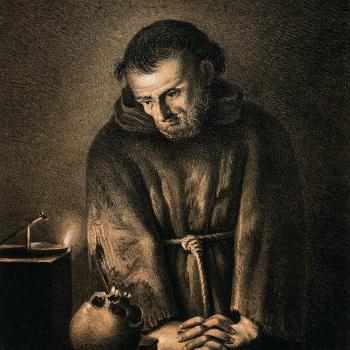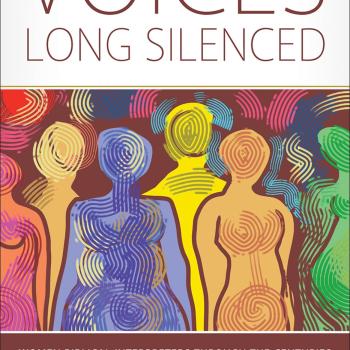Richard Beck, professor of psychology at Abilene Christian University in Texas, has just released a book that will certainly be a finalist for “most whimsical title.” Hunting Magic Eels: Recovering an Enchanted Faith in a Skeptical Age covers a lot of ground that I love: looking at sacramentalism, Celtic spirituality, mysticism, contemplation, and even a sprinkling of Tolkien and C.S. Lewis, to make the case that what Christianity needs today is not a more robust theology, more clever apologetics, more worthy causes, or more heroic sanctity (even though all of these things have their place) — but a more enchanted world-view.
What does that mean? As Beck puts it, enchantment is the “ability to see and experience God as a living, vital presence in our lives.” But it’s more than just the capacity to recognize God’s presence: it’s also the belief in the entire spiritual cosmology: heaven and hell, angels and demons, miracles and supernatural wonders.
We have lost our belief in spiritual and supernatural reality because of the increasing centrality of the scientific/empirical worldview, that enables us to create technological marvels but also has subtly undermined the human capacity for wonder, imagination, interiority, and belief. Beck asserts that we have stopped believing in God because our empirical worldview has made it both unnecessary and impossible to believe.

So how do we re-enchant our dis-enchanted world? Beck invites us to begin by simply paying attention. Lingering over the wonders and marvels that life brings our way. Remembering that some of life’s greatest joys — love, relatedness, hope, dreams, the imagination — all invite us outside the realm of what can be scientifically measured and quantified. Paying attention to what Beck calls “the ache” — our existential restlessness, akin to St. Augustine’s famous prayer “Our hearts are restless until they rest in You.” From there we are invited to pay attention as well to what he calls “eccentric experiences” — those encounters with events or moments in our lives that are offbeat, weird, inexplicable, or mysterious. For an example, he tells the story of how Country music star Johnny Cash, in the nadir of his prescription drug addiction, was considering suicide, only to hear an interior voice proclaim “I am still here.” The voice of God? An angel? Cash’s own soul? Does it really matter? The point is, that “eccentric experience” invited Johnny to see the world from a new perspective, which may very well have been the turning point that saved his life.
Beck offers a variety of ways we can learn to pay attention to the ache and the eccentric experiences that invite us back into a more enchanted worldview and faith. I kept nodding in appreciation: indeed, his table of contents almost sounds like a site map for my blog! Successive chapters consider how liturgy, contemplation, charismatic prayer, and Celtic spirituality can all invite us back into that weird place where we remember that faith is, essentially, numinous — and thereby open ourselves up to discover the Divine Presence that can never be measured or put into words, but that can be embodied, encountered, and experientially known.
Beck is a Protestant and he suffers from either his own deeply rooted anti-Catholic prejudice, or at least a fear that his readers are suspicious of Catholicism. He speaks warmly about attending Catholic school and tells a funny story about his first Ash Wednesday. He relies on quotations or stories from many Catholic saints and mystics — Thomas Merton, Blaise Pascal, Mother Teresa — to illustrate his points. He freely acknowledges that the sacramental spirituality of Catholicism — the world of icons, holy water, statues, Gregorian chant, and incense — creates a far better ambience for re-enchantment than most Protestant churches, especially the newer ones that feel more like a concert hall than a temple. But he keeps insisting that Catholicism is prone to error and that Protestant theology is necessary to safeguard against that. After he repeatedly makes such a disclaimer, I began to wish that he had taken the time to read Brian McLaren’s A Generous Orthodoxy, which might have helped him to be more accepting of the fact that different Christians do things differently, and perhaps we simply need to accentuate what is positive about those we disagree with, and not waste so much time insisting that they’re wrong.
This dualistic mindset reasserts itself toward the end of the book, when Beck talks about what he regards as false enchantments, including new age and neopagan spiritualities. So we discover that Beck is all for restoring a numinous dimension of life and society, as long as it’s according to his specific theology: narrowly Christian, theologically Protestant with a little bit of Catholic culture mixed in to keep things spicy. It seems to me that at the end of the day, Beck is advocating for a pretty judgmental, patriarchal God. Which is unfortunate, because I think his unspoken theological assumptions will undermine this book in the eyes of a lot of savvy readers.
Christianity is a religion that makes fairly bold moral claims — forgiveness is better than judgment, compassion is better than indifference, mercy is better than revenge. As Christians we are called to love our enemies, acknowledge the presence of God in our hearts (and the hearts of others), and to be lavish and generous in our care for others and our self-giving to God. I wish Beck had taken a deep dive into these portals of re-enchantment, rather than fussing about theological correctness or the errors of astrology. He didn’t quite seal the deal when it came to making his case for re-enchantment; he comes across as the kind of guy who, on a first date, would talk about the importance of having a pre-nup. Yes, boundaries are important: but there’s a time and a place for such things.
Hunting Magic Eels has important things to say, even with its flaws. I think this book will ultimately be the most useful to Christians who want or desire advice for how to strengthen or deepen their own spiritual lives in the face of our relentlessly secular/empirical society. I can’t see it wooing those who have already walked away from the faith, which is too bad. It’s certainly not going to endear itself to Catholics, many of whom need its message as much as Protestants do. Even so, maybe it will help those who already dare to believe — to more fully give themselves to the mysterious wonder of just how adventurous such belief can truly be.
Enjoy reading this blog?
Click here to become a patron.


















